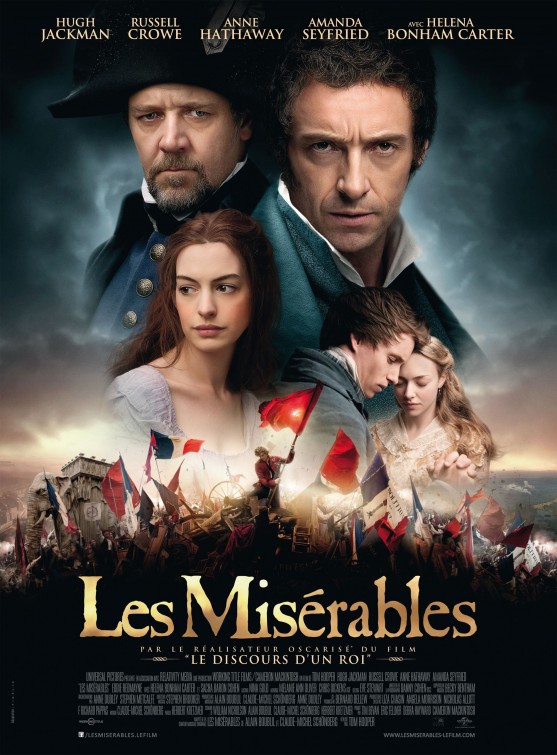
Nordling here.
Disclaimer – I have not seen the stage version of LES MISERABLES. I’ve read Victor Hugo’s novel, but it’s been many years. People out there who are sticklers to the source material, both stage play or book – fair warning. LES MISERABLES the stage play is much beloved, and those who are married to it may find the movie, at the very least, mildly disconcerting.
That’s because Tom Hooper isn’t interested in simply reenacting the play. Hooper has remembered something essential that, I feel, too many directors turning stage musicals into movies have forgotten – that musicals have to work as a movie first, with the appropriate scale, intimacy, and immediacy. Films like RENT try too hard to reenact the stage show when a wider, more generous vision is required. Belting out a song to the back rows of a stage production is quite different than singing a song onscreen. Onscreen, the effect is immediate, and the rapport with the audience is instant. We are there when Anne Hathaway sings “I Dreamed A Dream” and we share in her woes. On stage, there is a literal and figurative distance to the goings-on, and so much of the emotion is overplayed just to make it to the back of the theater.
LES MISERABLES dispenses with the formalities. This is big, bold entertainment, and after seeing it like this I’m not sure I would enjoy the distance of the stage play. There are moments in LES MISERABLES that are full of emotion and heartbreak – Tom Hooper, instead of recording the music and singing in post-production, wisely has the actors perform and sing in front of the camera, and the result is something far more cinematic and meaningful. Hearing “I Dreamed A Dream” on stage is one thing, but here we are thrust into Fantine’s (Anne Hathaway) complete and utter despair, and in one take and three minutes Hathaway gives probably the best performance of her career. This is a song about the acceptance of hell, and Hathaway holds nothing back. It is a raw, passionate moment.
Jean Valjean (Hugh Jackman) is released on parole after years of hard labor, sentenced because he stole a loaf of bread. Javert (Russell Crowe) reminds Valjean that he will always be a criminal, and if Valjean slips once, or fails to report his parole, Javert will be there to pursue him. One night Valjean comes to a monastery, and in a fit of rage and desperation steals their silver. However, when he is caught, the Bishop (Colm Wilkinson) refuses to indict Valjean. Breaking his parole, Valjean vows to use his new money and his life for good.
When Valjean fails to save Fantine, one of his factory employees, from despair, prostitution, and death, he decides to give the best life he can to her daughter, Cosette (Isabelle Allen as a child, Amanda Seyfried as a young adult), who is being held at the Thenardiers’ (Sacha Baron Cohen and Helena Bonham Carter) house of ill repute. For years, Valjean and Cosette are in hiding from the cruel Javert, but when Cosette falls in love with the young rebel Marius (Eddie Redmayne), Valjean realizes that his life of running from Javert is coming to an end. As for Javert, he will do everything in his power to bring Jean Valjean to justice, and to stop the rebellion brewing in Paris’ streets.
Hugh Jackman is at his pinnacle playing Jean Valjean – finally he has found a character that encompasses all of his considerable talents. Amanda Seyfried and Eddie Redmayne are also terrific, with wonderful singing voices and the passion to go along with them. But Hathaway is the real revelation in LES MISERABLES – her short screen time makes an impact through the entire movie. As for Russell Crowe, his singing voice is a bit abrasive in comparison to the other talent on display, and while his performance works, his singing is jarring at times. But again, it adds to the immediacy of Tom Hooper’s work adapting the play. Because Hooper is making a movie and not a stage musical, Crowe’s rock and roll voice works for the most part. Jackman has had years of stage experience and Crowe simply can’t compete with that – instead, Crowe’s voice is the discordant note that marks him as the villain of the piece. Sacha Baron Cohen and Helena Bonham Carter bring much needed levity to the sometimes dire tone of the movie. Samantha Barks as Eponine, the woman who pines for Marius as he becomes smitten with Cosette, is also very good – her voice is lovely and rich.
There is very little spoken dialogue in LES MISERABLES, and there are moments that may remind more savvy audiences of the parody in SOUTH PARK: BIGGER, LONGER, AND UNCUT. Those who don’t enjoy musicals in general certainly won’t be swayed by LES MISERABLES. It makes no apologies for wearing its emotions on its sleeve. But I’ve always admired musicals. I especially love musicals that are more cinematic than stagy – like the Busby Berkeley musicals of old, LES MISERABLES remembers that the vast playground that is the cinema screen is far less limiting than the stage, and Tom Hooper has stayed loyal to the source and yet has made it seem new and real in a way that the stage could not hope to achieve. For fans of the stage play, the movie may be too immediate – the singing is definitely rawer and less polished, but the trade-off for that is that the performances feel so much more genuine because of it. The emotion on display here strikes directly at the audience’s soul. This is no sterile adaptation of the stage play – LES MISERABLES is passionate and true.
